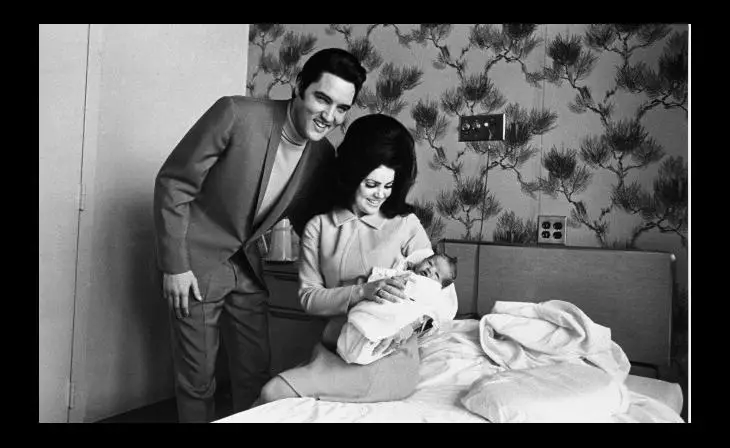Uncovering the Untold Story of Elvis and Lisa Marie in the Ghetto
Elvis Presley, known as the “King of Rock and Roll,” is a household name and one of the biggest icons in music history. His daughter, Lisa Marie Presley, also gained fame for her own musical career and being the only child of the legendary Elvis Presley. While their lives were constantly in the spotlight, there is one aspect that many people may not be aware of – their time spent in the ghetto.

In this blog post, we will take a deeper look into the untold story of Elvis and Lisa Marie’s experiences in the ghetto. From their impact on each other to their humanitarian efforts, we will uncover the truth behind their time in the midst of poverty and how it continues to shape their legacy today.
Elvis and Lisa Marie in the Ghetto
The Impact of Poverty on Elvis and Lisa Marie’s Relationship
Elvis and Lisa Marie’s bond was one that went beyond father and daughter – they shared a deep love for music and a strong connection with each other. However, their relationship would face a major test when they found themselves living in the ghetto.
Ranking Elvis Presley’s Albums A Comprehensive Guide
Uncovering the Untold Story of Elvis Presley A Must-Watch Documentary
In 1969, Elvis purchased a home in the Lauderdale Courts housing project in Memphis, Tennessee, which was known for its high poverty levels and crime rates. It was during this time that Lisa Marie was just six years old and was beginning to spend more time with her father. She would often accompany him on tour and even made appearances on stage with him.

For a young girl growing up in such a disadvantaged environment, it was a harsh reality that she had to face. In an interview with Oprah Winfrey, Lisa Marie recalled how difficult it was for her to see the struggles of those around her. She said, “I was exposed to seeing and understanding people who didn’t have anything, so I didn’t really feel like I did either.”
This experience had a profound impact on both Elvis and Lisa Marie’s relationship. It brought them closer together as they relied on each other for comfort and support in the midst of poverty. However, it also exposed them to the harsh realities of life that they may not have otherwise been aware of.
From Graceland to the Ghetto: The Journey of Elvis and Lisa Marie
The Presley family was no stranger to poverty – Elvis grew up in a small two-room house in Tupelo, Mississippi, and his parents often struggled to make ends meet. However, their move to the ghetto was a drastic change from their lavish lifestyle at Graceland, where they lived prior to their time in the Lauderdale Courts project.
Elvis was known for his generosity and his desire to help those in need, and it was this compassion that led him to purchase the home in the ghetto. He wanted to use his fame and wealth to make a positive impact on the lives of those living in poverty.

Lisa Marie also recalls how her father would take her to different neighborhoods in Memphis and show her the reality of poverty. She said, “He would drive me through parts of Memphis and tell me to look around because I would never see this kind of poverty or sadness in my own life.”
Their journey from Graceland to the ghetto not only opened their eyes to the struggles of others, but it also allowed them to use their privilege and resources to make a difference.
Exploring the Controversy Surrounding Elvis and Lisa Marie’s Time in the Ghetto
While Elvis and Lisa Marie’s presence in the ghetto was meant to bring about positive change, it also sparked controversy and criticism. Some saw it as a publicity stunt while others questioned their motives for wanting to live in such a dangerous and impoverished neighborhood.
In response to the backlash, Elvis said, “The only thing I can do is live and die with my own conscience. If I thought more of myself, I would be ashamed to even walk out on the streets.” He believed that it was his responsibility to use his platform for good and help those in need, regardless of what anyone else thought.
Despite the criticism, Elvis continued to live in the ghetto and even opened up a community center there. He also made monetary donations and organized charity events to provide assistance to those living in poverty.

Lisa Marie has also faced criticism for her involvement in the ghetto. Some have argued that she exploited her privileged position to gain fame and success in the music industry, while others believe that her experiences in the ghetto were simply a way for her to connect with her father.
However, Lisa Marie has always been vocal about her love and dedication to the people of the ghetto and their struggles. She has used her voice and platform to raise awareness and support for various social causes, including poverty and homelessness.
A Closer Look at Elvis and Lisa Marie’s Humanitarian Efforts in the Ghetto
Elvis and Lisa Marie’s time in the ghetto was not just limited to living there – they also actively participated in humanitarian efforts to improve the lives of those in need.
In addition to opening a community center, Elvis also made generous donations to schools, churches, and hospitals in the area. He was known to personally deliver food and gifts to families during the holiday season, and he even paid for the funerals of several residents who could not afford it.
Lisa Marie also followed in her father’s footsteps by establishing her own charitable foundation, Presley Place, which provided assistance to those struggling with homelessness and addiction in the Memphis area. She also supported various organizations that focused on education, healthcare, and housing for low-income communities.
Their humanitarian efforts in the ghetto continue to make an impact even decades after their time there. The community center that Elvis opened is still in operation today, and both Elvis and Lisa Marie’s foundations have helped countless individuals and families in need.
The Significance of Elvis and Lisa Marie’s Presence in the Ghetto
Elvis and Lisa Marie’s time in the ghetto was not just a brief stint – they lived there for several years and made a significant impact on the community. Their presence brought attention to the poverty and struggles faced by residents in the area, and their efforts to help those in need were a glimmer of hope in the midst of despair.
Their decision to live in the ghetto also challenged societal norms and stereotypes, as it showed that people from all walks of life can come together and make a positive difference. It also highlighted the importance of using one’s privilege and resources to uplift others and bring about change.
Moreover, their experiences in the ghetto had a lasting impact on both Elvis and Lisa Marie. It shaped their perspectives and values, and it allowed them to develop a deeper sense of empathy and compassion towards those in need.
Uncovering the Truth Behind Elvis and Lisa Marie’s Experiences in the Ghetto
As with any story involving celebrities and controversy, there are often many rumors and misconceptions surrounding Elvis and Lisa Marie’s time in the ghetto. However, it is important to uncover the truth behind their experiences and recognize the impact they had on the lives of others.
One common misconception is that Elvis only lived in the ghetto for a short period of time and then quickly moved back to his lavish lifestyle at Graceland. In reality, he lived in the Lauderdale Courts project for almost two years and continued to visit the area frequently even after moving back to Graceland.
Another misconception is that Lisa Marie only lived in the ghetto because her parents were going through a divorce and she needed to spend time with her father. While it is true that her parents’ relationship was strained during this time, Lisa Marie has stated that she genuinely enjoyed living in the ghetto and felt a strong connection to the community there.
The Legacy of Elvis and Lisa Marie’s Time in the Ghetto
Elvis and Lisa Marie’s presence in the ghetto may have been short-lived, but their impact continues to be felt even today. Their dedication to helping those in need, despite facing criticism and controversy, serves as an inspiration for others to use their platform for good and make a positive difference in the world.
Their legacy also sheds light on the issue of poverty and the struggles faced by those living in underprivileged communities. It reminds us of the importance of addressing these issues and working towards creating a more equal and just society.
Examining the Role of Music in Elvis and Lisa Marie’s Ghetto Experience
Music played a significant role in Elvis and Lisa Marie’s lives, both before and during their time in the ghetto. For Elvis, music was a way to connect with people from all walks of life, and it served as a source of comfort and hope for those struggling in the ghetto. He often performed at local churches and schools, bringing joy and entertainment to the community.
Lisa Marie also found solace in music during her time in the ghetto. She recalls how her father would teach her different songs and encourage her to sing along, which helped to distract her from the harsh realities of poverty around her.
Additionally, music was a means for Elvis and Lisa Marie to bond and strengthen their relationship. As they sang and danced together, it brought them closer together and provided a sense of normalcy in the midst of a turbulent environment.
Lessons Learned from Elvis and Lisa Marie’s Time in the Ghetto
Elvis and Lisa Marie’s time in the ghetto teaches us many valuable lessons that are still relevant today. It shows the power and impact of using one’s privilege and resources to help those in need. It also reminds us of the importance of empathy and understanding towards others, regardless of their background or circumstances.
Their experiences also serve as a reminder to not let societal norms and stereotypes dictate our actions. Elvis and Lisa Marie’s decision to live in the ghetto challenged these norms and showed that anyone can make a positive difference in the world, regardless of their status or image.

Conclusion
In conclusion, the untold story of Elvis and Lisa Marie in the ghetto sheds light on an often overlooked aspect of their lives – their time spent living among poverty and hardship. Their presence in the ghetto had a profound impact on each other, the community, and their legacy.
Through their humanitarian efforts and dedication to helping those in need, they showed us the true power of using one’s platform for good. It is a reminder to all of us to be compassionate, empathetic, and to always strive for positive change in the world.
Uncovering the Untold Story of Elvis Presley A Must-Watch Documentary

